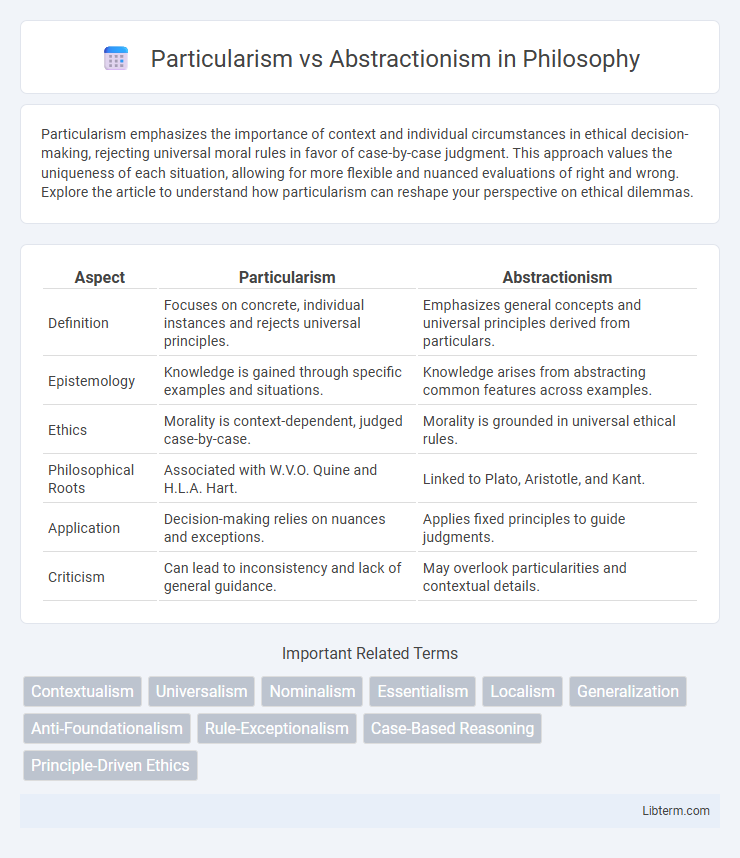Particularism emphasizes the importance of context and individual circumstances in ethical decision-making, rejecting universal moral rules in favor of case-by-case judgment. This approach values the uniqueness of each situation, allowing for more flexible and nuanced evaluations of right and wrong. Explore the article to understand how particularism can reshape your perspective on ethical dilemmas.
Table of Comparison
| Aspect | Particularism | Abstractionism |
|---|---|---|
| Definition | Focuses on concrete, individual instances and rejects universal principles. | Emphasizes general concepts and universal principles derived from particulars. |
| Epistemology | Knowledge is gained through specific examples and situations. | Knowledge arises from abstracting common features across examples. |
| Ethics | Morality is context-dependent, judged case-by-case. | Morality is grounded in universal ethical rules. |
| Philosophical Roots | Associated with W.V.O. Quine and H.L.A. Hart. | Linked to Plato, Aristotle, and Kant. |
| Application | Decision-making relies on nuances and exceptions. | Applies fixed principles to guide judgments. |
| Criticism | Can lead to inconsistency and lack of general guidance. | May overlook particularities and contextual details. |
Introduction to Particularism and Abstractionism
Particularism emphasizes the importance of individual cases and context-specific details in ethical decision-making, rejecting universal moral principles. Abstractionism relies on general rules and abstract principles to guide judgments across diverse situations. Understanding the tension between Particularism and Abstractionism reveals foundational differences in approaches to ethics, law, and philosophy.
Defining Particularism: Core Principles
Particularism asserts that moral judgments depend on the specific context and that no fixed set of moral principles applies universally. This approach emphasizes the importance of context-sensitive evaluation, arguing that what is morally right or wrong varies with each situation's unique details. Core principles of particularism include rejection of overarching moral rules and prioritization of case-by-case ethical consideration.
Understanding Abstractionism: Key Concepts
Understanding abstractionism involves recognizing its core principle of extracting general ideas from specific instances, allowing for broad application across contexts. This approach emphasizes the creation of universal concepts and categories that transcend individual cases, facilitating easier problem-solving and knowledge transfer. Key concepts include conceptual generalization, symbolic representation, and the reduction of complexity through abstract models.
Philosophical Roots of Particularism
Philosophical roots of Particularism trace back to Aristotle's emphasis on concrete particulars and empirical observation as the foundation of moral knowledge. Particularism challenges universal moral principles by arguing that ethical judgment depends on the context and specifics of each situation rather than abstract rules. This approach is rooted in ancient virtue ethics and contrasts with abstractionism, which relies on generalized principles and theoretical frameworks for moral reasoning.
Historical Development of Abstractionism
Abstractionism in philosophy evolved significantly during the early modern period, emphasizing the mind's ability to derive universal concepts from particular experiences. This approach was notably advanced by thinkers like John Locke and later Immanuel Kant, who explored how abstract ideas form the basis of knowledge. The historical development of abstractionism contrasts with particularism's focus on concrete, individual instances, marking a shift towards systematizing knowledge through general principles.
Key Differences Between Particularism and Abstractionism
Particularism emphasizes the importance of context and individual cases in understanding concepts, while Abstractionism relies on general principles and universal categories to analyze phenomena. Particularism rejects fixed rules, arguing that moral or conceptual judgments depend on the specific details of each situation, whereas Abstractionism seeks to apply consistent, abstract criteria across diverse instances. The key difference lies in Particularism's focus on concrete particulars versus Abstractionism's emphasis on abstract generalizations.
Practical Implications in Ethics and Decision-Making
Particularism in ethics emphasizes context-specific moral judgments, asserting that the moral relevance of particular factors varies across different situations, which challenges rigid rule-based decision-making. Abstractionism advocates for universal ethical principles that apply consistently, providing clear guidelines but potentially overlooking nuances in individual cases. Practical implications include that particularism promotes flexibility and responsiveness in ethical decisions, while abstractionism supports predictability and consistency, influencing approaches in fields like law, medicine, and business ethics.
Case Studies: Particularism versus Abstractionism in Practice
Case studies comparing particularism and abstractionism demonstrate how particularism emphasizes context-specific decision-making, tailoring judgments to unique circumstances, while abstractionism relies on general principles and rules to guide consistent application across cases. In legal and ethical analysis, particularism often leads to nuanced outcomes by focusing on individual case details, whereas abstractionism promotes predictability and uniformity by applying overarching concepts. Empirical evidence from judicial rulings and moral reasoning research highlights the tension between these approaches in balancing flexibility with systematic coherence.
Critiques and Debates in Contemporary Philosophy
Particularism challenges the notion of universal moral principles by emphasizing context-specific judgments, while abstractionism advocates for overarching ethical rules derived from generalizable concepts. Critics of particularism argue it risks moral relativism and inconsistency, whereas abstractionism faces debates over its potential detachment from real-world complexities. Contemporary philosophy scrutinizes these positions through discussions on the applicability of principles versus the nuances of particular cases in ethical decision-making.
Conclusion: The Future of Particularism and Abstractionism
Particularism and abstractionism represent two essential approaches to knowledge and ethics, each offering unique strengths for future application. The ongoing integration of particularism's context-sensitive insights with abstractionism's systematic frameworks promises to enhance decision-making and theoretical development across disciplines. Emerging trends in cognitive science and philosophy suggest a future where these perspectives coexist, fostering nuanced understanding and practical balance.
Particularism Infographic

 libterm.com
libterm.com